As a teacher and researcher, I’ve always believed that mentorship doesn’t stop with graduation. Whether pursuing an advanced degree program, building a career or simply deciding what comes next, Reading Comprehension & Cognition (RCC) Lab Assistants know that I am always available to offer advice and guidance.
Catch up with some of our most recent alumni and learn how their experiences in the lab helped shape their career decisions and what advice they would share with future lab assistants.
Sarah Gray – Class of 2025

Lab Alumni Sarah Gray (’25)
I’m in my first year of my Master’s program in Speech and Language Pathology at Massachusetts General Hospital Institute of Health Professions (MGH IHP) in Charlestown, Massachusetts. Along with my coursework, I provide speech therapy to two clients in the Julie Atwood Speech, Language, and Literacy Center (SLLC). One of my clients is four years old and working on speech and language goals, and the other is nine and working on literacy goals. We just finished our assessment period, which consisted of getting a comprehensive background through an ethnographic conversation with the caregivers and administering several assessments to better understand their strengths and areas of need. It has been such a meaningful experience so far, and I’m excited to keep learning more about how I can best support my clients!
Working in the RCC Lab has helped me so much, both when applying to graduate school and now that I’m in it. It helped me to feel confident in collaborating with others in a close team environment. Even within my first few weeks of graduate school, I was already working alongside students in occupational therapy, physical therapy, nursing, and genetic counseling. These collaboration skills I built in the lab – such as brainstorming in a group, dividing responsibilities, and problem-solving – have been incredibly valuable. I am grateful for the opportunity to strengthen these skills in the RCC lab.
The lab became a place where I could truly learn by doing and not be afraid to make mistakes. Dr. SB has created an environment in the lab that encourages the labbies to explore what part of the research process we are interested in and take on these experiences that may feel intimidating at first. I have found that learning happens best when you put your best self out there and give it your all. Looking back on my experience in the lab, I am very thankful for this space to learn and grow as a researcher.
One of the best parts of being in the lab has been meeting the other labbies. What started as classmates and labbies has truly grown into meaningful and close friendships that will last a lifetime. We have spent many long days in the lab supporting each other, learning together, and laughing together. I am forever grateful that the lab has brought me these friendships.
If I were to give advice to current and future research assistants, I would say to show up fully for every experience that comes your way. Be grateful for the moments that challenge you just as much as the ones that come easily. Every once in a while, take a moment to step back and recognize how far you’ve come. Sometimes it’s easy to forget when you’re in the middle of it all. And lastly, find a balance between working hard and giving yourself grace.
Gracie Ouellette – Class of 2024
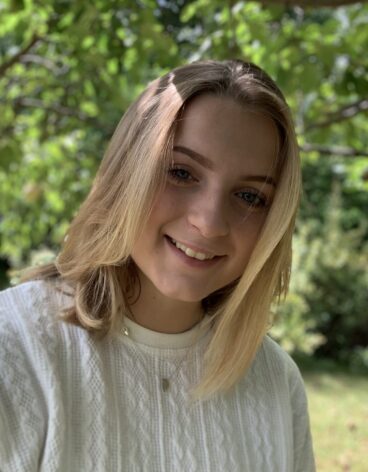
Lab Alumni Gracie Ouellette (’24)
I am currently working as a Psychometrist for a private neuropsychology practice in Portsmouth, NH where I am responsible for administering and scoring neuropsychological assessments for children, adolescents, and adults. The neuropsychologist then uses these assessments to complete a comprehensive evaluation that outlines an individual’s cognitive and social-emotional strengths and weaknesses. In turn, we are able to help individuals succeed in their personal lives, at work, and most commonly in school. I am very grateful to be able to get to do this work as my ultimate goal is to get into a PhD program within the next couple years so I can become a Neuropsychologist myself!
The RCC Lab has helped me transition into post-grad life in many ways. First, it helped me tremendously in gaining the technical skills I need to succeed in my current job. Namely, Dr. SB helped me to become a conscious consumer of research, to understand statistics that once scared me (a lot), to embrace the process of trial and error, and to gain confidence in my abilities and in my capacity to be a strong leader.
The lab also helped me to become close with some really amazing people, who continue to push me further today in both the personal and professional aspects of my life. The first few months after post-grad can be tough, and it was for me. But the people I worked with in the lab continued to help me regain my confidence to pursue my passion in this field, and to land the job I had been wanting since before graduation.
If I were to give any advice to current and future research assistants, I would have a few points. First, lead through this experience with curiosity – ask all your questions and listen to each other’s ideas. Second, do it scared – this goes for experiences in the lab as well as in your personal lives. Growth is uncomfortable and novelty can induce fear, leading us to doubt ourselves. Push forward anyway, you will be amazed at what you can accomplish. And for the seniors – slow down and take it all in. This goes for both the challenging moments and the joyful ones. Neither are permanent, and that’s okay. Let the acknowledgement of this impermanence help you to revisit and fully appreciate the present.
Lauryn Alley – Class of 2024
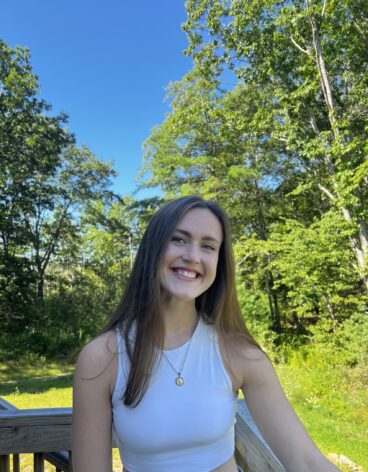
Lab Alumni Lauryn Alley (’24)
I am currently in the first year of my MA/CAGS program in School Psychology at William James College in Newton, MA. In addition to attending my classes, WJC has first year students working in the field as soon as the second week of school! I have had the pleasure of working with two school psychologists as a practicum student at Florida Ruffin Ridley, a K-8 school in Brookline, MA.
Working in the RCC lab helped me tremendously while I was applying to graduate school and continues to help me as I navigate this new level of academia. One of the greatest skills that the RCC lab fostered in me was assertiveness and collaboration. I can confidently express my ideas, questions, and disagreements while effectively working with others in the academic and practicum setting. Having strong skills in these areas has allowed me to excel in my coursework, take on leadership responsibilities, and take advantage of the resources and support that I would not have known about if I had not advocated for myself!
The best advice I can give to current and future research assistants is to soak it all in and enjoy every experience you are presented with! Being a member of the labbie crew provides so many wonderful opportunities but one of the greatest things the lab gave me was amazing connections and friendships. The lab meetings, conference submission deadlines, and data collection can be overwhelming and stressful at times. But sitting in our own little space together and seeing my fellow research assistants is something I miss frequently. Enjoy your time in the lab because unfortunately it will have to come to an end, but the labbie connections are lifelong!
Haley Enos – Class of 2023
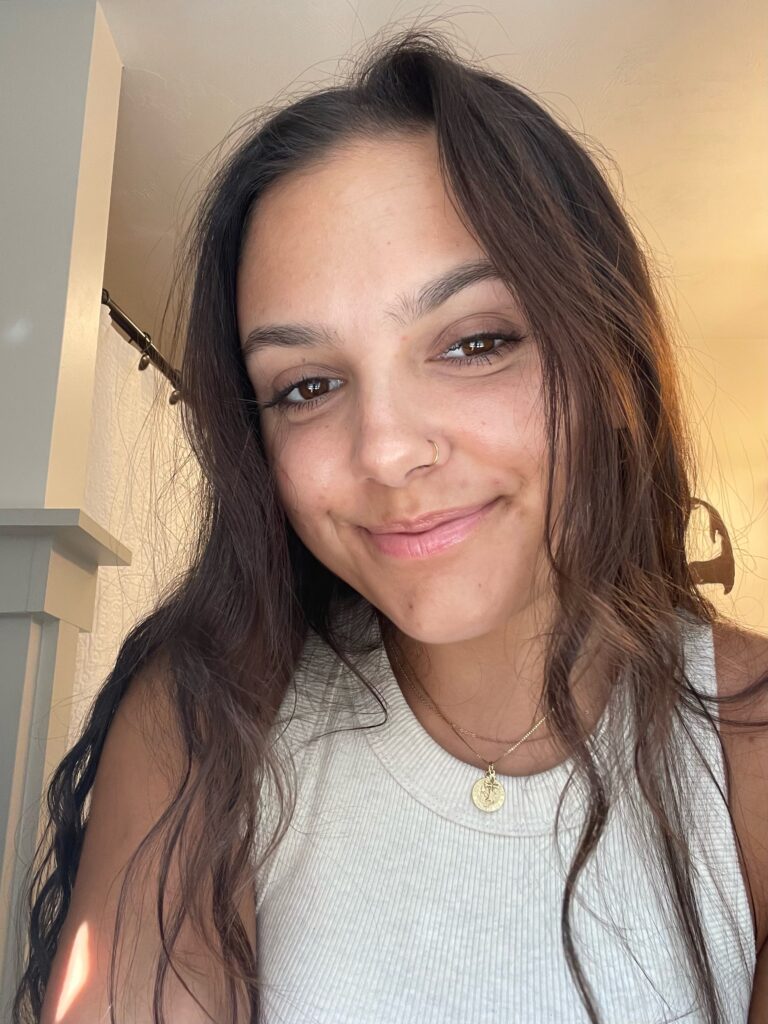
I’m currently working as a Behavior Technician for Southeastern ABA, a company that provides behavioral health services to children and families in Massachusetts and across Cape Cod. I work with a handful of clients of varying ages on the autism spectrum, providing them with direct services in their homes, schools, and community. In my role as a BT I support and challenge our clients, helping them to build life skills and improve their daily lives in several areas.
Working in the RCC lab helped me tremendously when it came to applying for, accepting, and beginning the job that I am currently doing. I think one of the most valuable skills that the RCC lab helps students to foster is taking initiative – why it’s important, when to do it, and how to go about it. Taking initiative has already benefited me so much in my life post undergrad. Having strong skills in this area has helped me receive a job offer in the field that I want to be in and to succeed in that job by taking advantage of resources and supports offered.
My best advice for current and future research assistants would be to appreciate the ordinary lab days just as much as the exciting, special ones. Although conferences and lab related events are things you will remember for a lifetime, weekly lab meetings and ordinary work days sitting next to follow research assistants will likely be missed just as much. Not only this, but taking advantage of other research assistants and the knowledge that they hold is a huge benefit of working in the RCC lab. Being a research assistant grants you access to so many helpful tools, materials, and people that can help prepare you for your life after undergrad. Take advantage of it all while you can!
Emily Newborough – Class of 2023
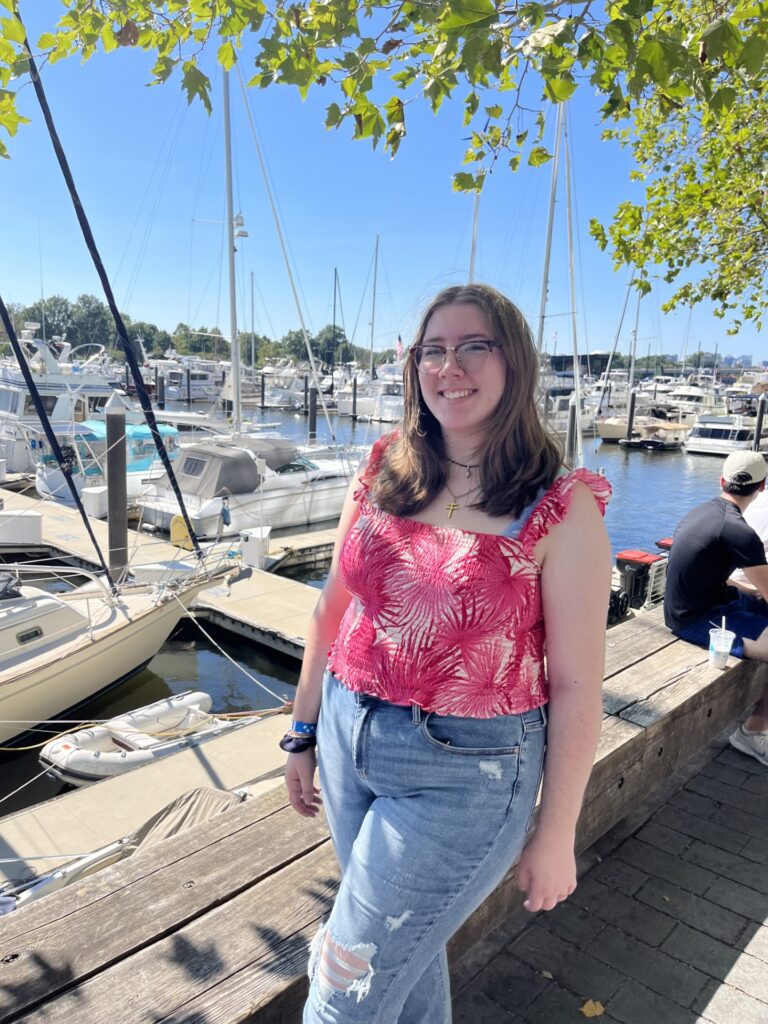
I am currently pursuing my Master of Arts in Forensic and Legal Psychology from Marymount University in Arlington, VA (in the DMV area, just a short metro ride from the heart of Washington D.C.). This fall I will be applying to Marymount’s counseling program as well to attain a dual degree in Clinical Mental Health Counselling. It’s really exciting and interesting to be learning about my specific interests!
I am grateful for my time within the RCC lab as without the guidance and support from Dr. Stiegler-Balfour and fellow labbies I would not have grown to the person I am today. Over the three and a half years that I was in the lab, I was exposed to so many opportunities and experiences such as attending national conferences, presenting research, analyzing data, and helping contribute to a published research article. I have grown both personally and professionally and will continue to utilize all that I have learned in graduate school and in my future career path. Working in a research lab in undergrad is such a unique opportunity that I highly recommend it to everyone if they have the chance!
My advice for current and future research assistants is that if you have one fleeting thought of ‘oh, should I do this?’ just do it! You never know where the future will take you if you do not take chances. The worst thing that can happen is you get told no, but at the end of the day you can say that you tried. Get stuck in and try to say yes to as many experiences, while not being detrimental to your mental health, because you may just find out that you love something you never thought you would.
Aubrey Sahouria – Class of 2022
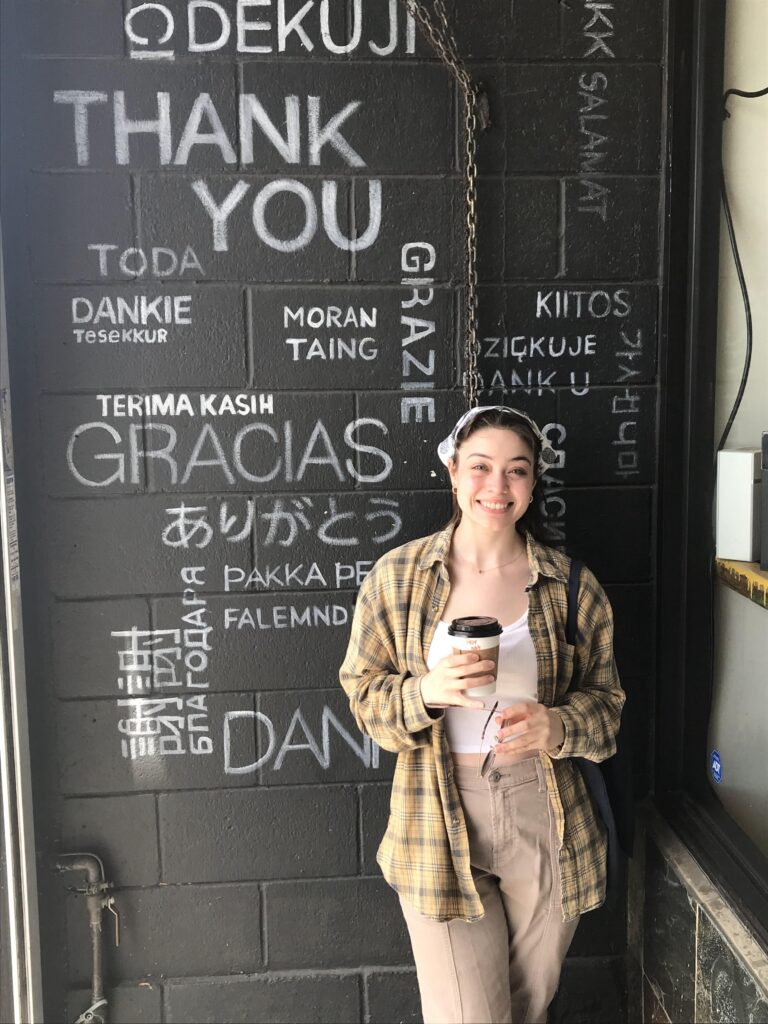
After graduating from UNE, I’ve once again found myself on the East Coast working as a Quantitative Research Assistant with the Center for Applied Linguistics, a non-profit in DC dedicated to promoting language learning and cultural understanding. I’m very happy to be here, as I get to work in the perfect cross-section of two of my favorite things – language and numbers!
My time in Dr. SB’s lab was valuable beyond measure. The experience I gained working with her and my fellow lab mates not only introduced me to the world of cognitive psychological and educational research, but also allowed me the space to develop my professional skills. She and the team always encouraged me to master the skills I learned in the lab, both technical and soft, and apply them to all of my professional endeavors. Even more valuable, perhaps, was the confidence instilled in me to know my worth as a scientist. The environment in Dr. SB’s RCC lab is one full of support, camaraderie, and growth – my time in the lab is what has shaped me into the scientist I am today.
To current and future RAs, I encourage you to do a few things. First, soak in every moment you can in the lab – form strong connections with your peers, take notes, and stay present. Second, actively seek out opportunities, don’t just wait for them. Look into the national conference, draft the proposal, ask who you can reach out to for advice on the internship – even if it doesn’t pan out the first time, the experience you gain with each step will help you navigate your next one. Lastly, take a moment to breath – mistakes may happen, and we can all learn from them; roadblocks may arise, but you are resilient and will find a way to navigate it. This is a fantastic chapter in your journey, so take a moment to breath, enjoy it, and make it one of your best chapters yet.
Grace Bernatchez – Class of 2021
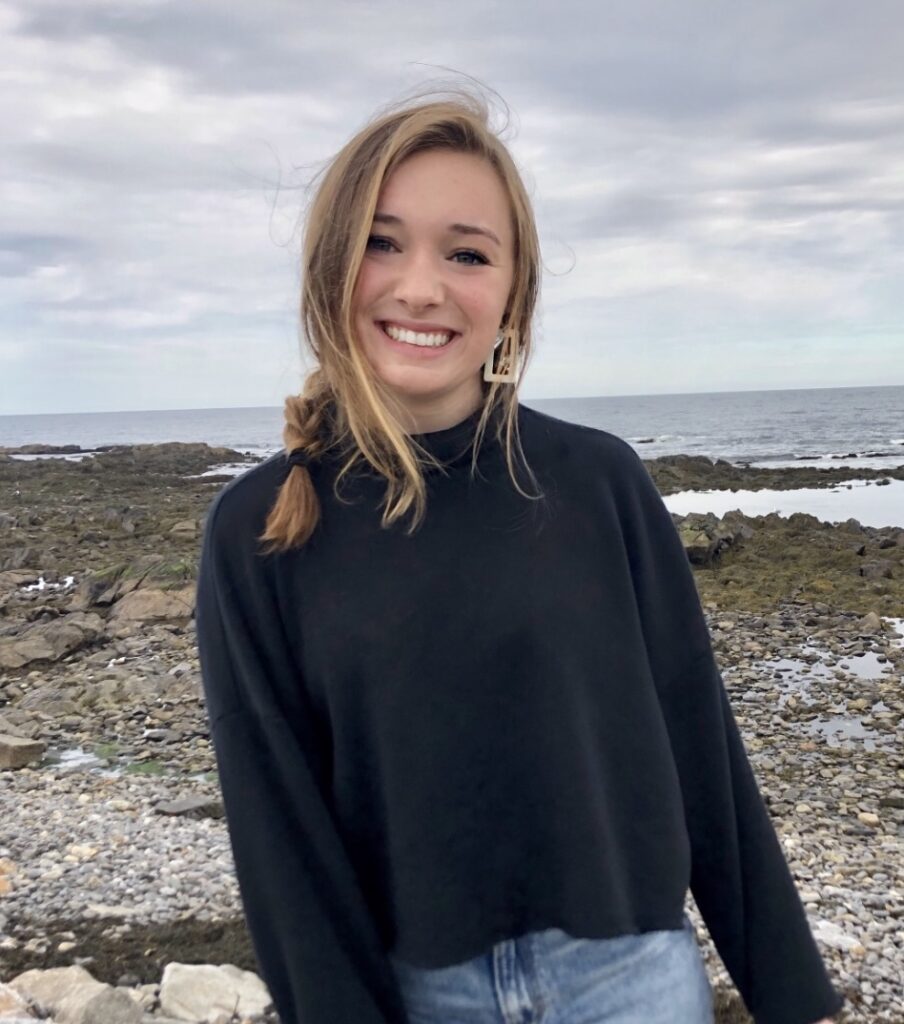
After graduation from UNE, I went back to my hometown, the one and only Manchester, NH. Due to my indecisive nature during my senior year at UNE, I decided after graduation I wanted to take a year off to determine what to do with my life. I took some time in hopes of making some decisions regarding my future profession, and to take a breather, travel, and make some money before going back to graduate school. Since graduation, I have been waitressing, substitute teaching, travelling (internationally and domestically), and will be moving to Hawaii for four months in February with two of my best friends. During this busy time, I have also been looking into the graduate schools I’m interested in and will be applying to very soon, in hopes of attending next fall.
Concerning my decision on what I wish to pursue, I think I would like to pursue a master’s degree in Social Psychology, with the end goal of becoming a professor at a college or university. This is the plan as of now. However, I’ve come to realize that life is extremely fluid, and anything can happen!
Working with Dr. SB and my fellow labbies in the Reading Comprehension and Cognition lab helped me in several areas. I never realized how much of an impact the research lab would have on me and in my everyday life. Conducting research taught me just how important it is to be a responsible receiver of information and, more importantly, when, and how to use objective data. Further, I became cognizant of what to look for in research papers. I became familiarized with what components made a good and trustworthy research study. I learned that I had a love for doing research and presenting the findings. Working in the research lab helped me grow personally, too. This opportunity taught me what I do and don’t like, how to come up with informed, objectively driven opinions, and allowed me to work with extremely bright peers and an inspirational professor.
To the current and future research assistants, my advice to you is work hard. The harder you work, the more you will accomplish, and the more connections you will establish. Most importantly, have fun. When working with your peers and PI (Dr. SB) don’t forget to laugh, even when things are stressful. At the end of the day, yes, this is extremely important work that you are doing but you want to enjoy it, as well. I always found a way to laugh through the stress and enjoy my time with my labbies and Dr. SB. Soak up every moment because trust me… it goes by way too fast.
Nicole Martin – Class of 2021
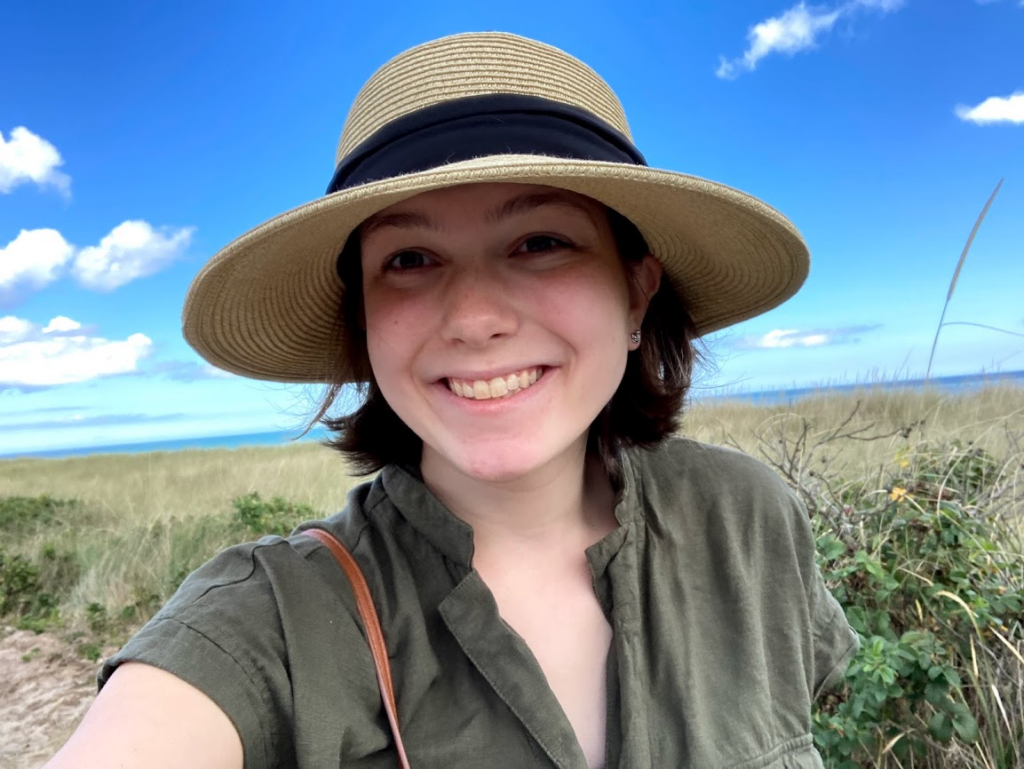
I still live in Maine and am currently working for Unum Insurance out of Portland. For a year after graduation, I was working at a local psychiatric hospital doing both clinical and academic research. As much as I loved the children, I wasn’t sure if this was where I could see myself spending the rest of my life.
After spending all four years of undergrad throwing myself at the goal of getting my PhD, changing my career objectives was extremely hard and quite honestly, slightly heart breaking. After a couple months of working at Unum, I found that I had no regrets about the switch. I love the culture, people and work in my new role. With the support of Unum, I am thrilled to be continuing my education next fall to get a Master of Arts in Organizational psychology. I am excited about it because this degree will help me take my background in psychology and passion for helping others and better utilize those skills in a business environment.
Throughout this journey, I have been incredibly grateful Dr. SB and the RCC family. Dr. SB has been an incredible mentor, advocate and supporter for me through all stages of my career which I am so so thankful for. Furthermore, the RCC lab helped me grow in my abilities of public speaking, communication, and leadership. The opportunity to serve as lab manager gave me an introduction to what it is like to manage people. The role was the foundation of my interest in effective leadership. I wrote a Research Assistant training manual, worked with labbies to help them work towards their goals and was able to gain feedback on their thoughts on my leadership. These opportunities have been amazing talking points in interviews and helped me to stand out. And bonus points- gives me so much joy to see all of the amazing things the wonderful ladies I worked with have gone on to do!
The best advice for future RAs is to be humble, curious, and forgiving, but also proud. No matter where you are in your career, whether you are a first year RA or a senior, you have so so much to learn and the RCC lab is the perfect place to accomplish all of this! Be curious to learn everything that you don’t even know you haven’t learned yet. Be forgiving of yourself and others when mistakes happen- they happen to the best of us. But don’t forget to stop and be proud of all you have accomplished, you deserve it. These are the most important lessons that I have learned in the RCC lab and what I will hold with me for the rest of my life.
Genna Companatico – Class of 2020
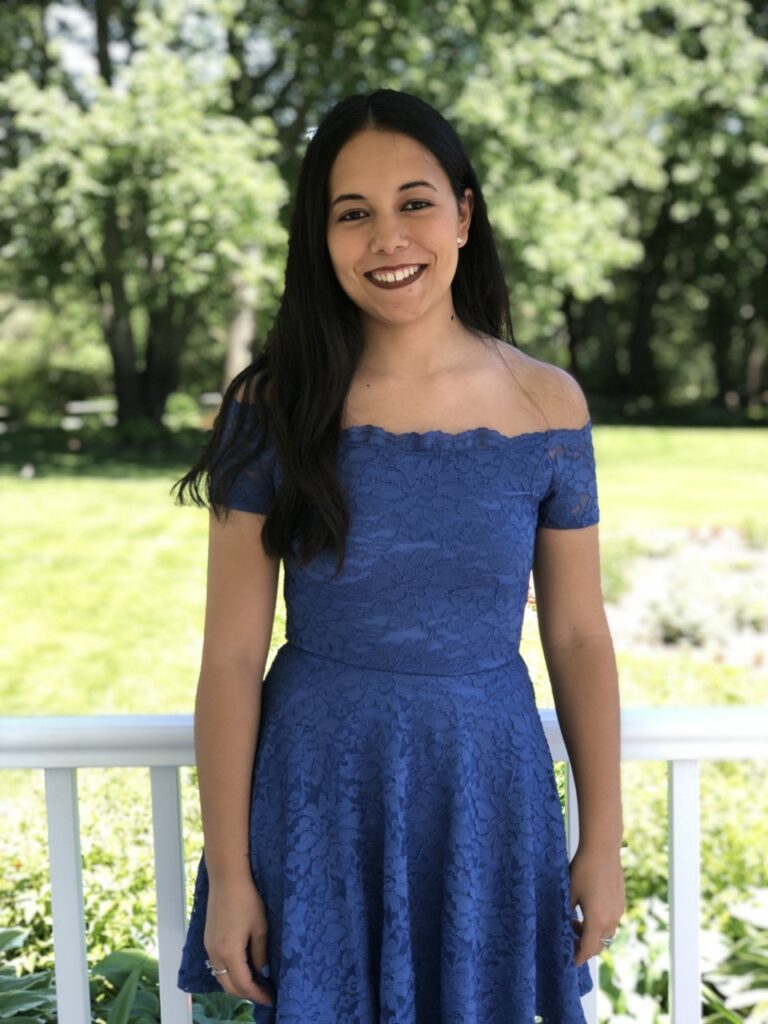
After graduating from UNE, I started my graduate program in Clinical Mental Health Counseling at Rhode Island College. I am also working as a Case Manager for The Providence Center. I hope to become a certified CMHC and work in a college counseling center!
Working in Dr. Stiegler-Balfour’s lab was an experience I will forever be grateful for. I learned many skills that I am able to transfer towards my graduate studies, as well as my current work in the field. These professional skills such as time management, organization, public speaking, and collaboration are going to help me as I continue in my studies. During my time at UNE, I had the most supportive labbies and memories that will never be forgotten. Also, with the guidance of Dr. Stiegler-Balfour, I gained a newfound confidence in my academic abilities, and was the necessary push I needed to apply to graduate school. I thank Dr. Stiegler-Balfour so much for believing in me, and allowing me to be a part of the RCC team.
Current and future research students: embrace every moment and be easy on yourself. Your time in the lab and at UNE in general is going to fly by, so enjoy every second of it! Also, this is a learning experience. There are going to be bumps in the road, or times when you are overwhelmed. However, do not forget that you have the support of Dr. Stiegler-Balfour and many wonderful labbies. Best of luck!
Courtney Parent – Class of 2019
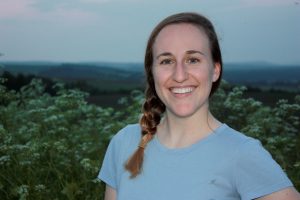
Since graduating from UNE, I’ve obtained my Master’s degree in Developmental Psychology from Teachers College, Columbia University. After spending six weeks as an adjunct instructor teaching Introduction to Psychology, I started training to be an administrative associate to Dr. Jeanne Brooks-Gunn at the National Center for Children and Families. Not only is it fantastic because this position is located in New York City, but it’s also fantastic because I’m gaining experience working directly with research grants and budgets, collaborating with researchers and policymakers in the field of developmental psychology, teaching graduate-level courses, and building off of the foundations I’ve learned at the RCC Lab.
Working under Dr. Stiegler-Balfour in the lab has been a truly incredible experience that I will forever be thankful for. Since working in the lab, I have had so many opportunities that I would not have received anywhere else. Attending and presenting at conferences has allowed me to improve on public speaking skills; writing a literature review has pushed me to think more critically and write more scientifically; and running participants, collecting and helping to analyze data, helping to design a new study, and programming survey software has furthered my knowledge about conducting research. These skills, among many others, will carry with me and further develop as I continue along my career path. Additionally, Dr. Stiegler-Balfour goes above and beyond to ensure that we (lab members) are prepared for life after undergrad. She prepares us well for job and graduate school applications and interviews by helping us to optimize our CVs, resumes, and cover letters such that our lab experiences and skills are well articulated. Dr. Stiegler-Balfour is a tremendous mentor, and I am grateful and humbled to have been part of her amazing lab.
To current and future research assistants, make the most out of every experience. Your time in the lab is valuable and should be a priority, so do not waste it. Stay true to yourself while keeping an open mind when approached with something new or challenging; you will grow from overcoming these new challenges. There will be some opportunities that come flying towards you and some that you may have to work a little bit harder for; take advantage of every one of those opportunities because they will lead to something greater than you have ever imagined. Most importantly, work hard, work diligently, and never give up.”
Ellie Leighton – Class of 2018
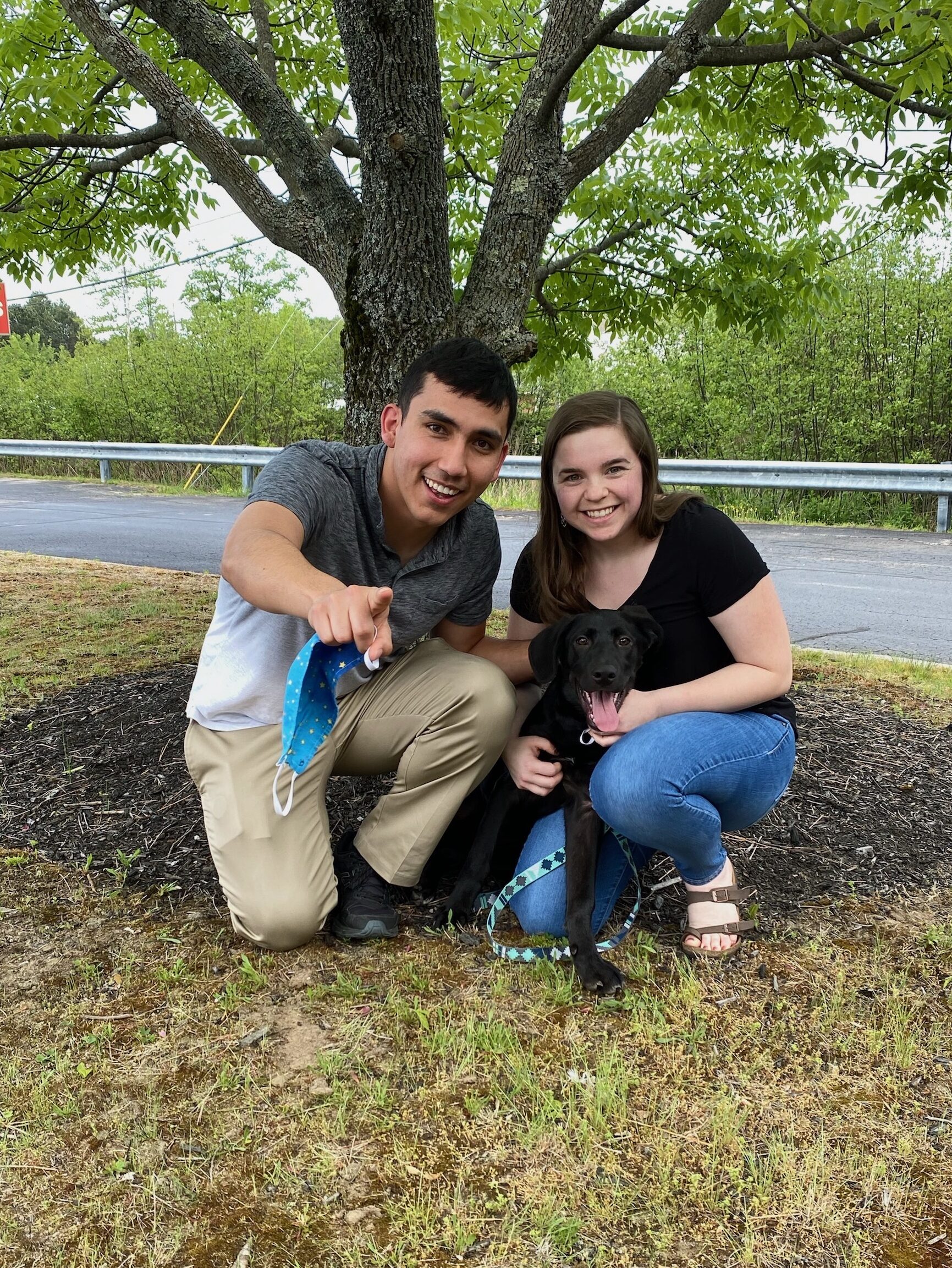
“I currently live in the Bangor area with my partner and my dog. We just bought a fixer upper and spend all of our free time working on it! I am a second year graduate student in the School Counseling program at Husson University and I work at the University in the Center for Student Success. I aspire to be a certified school counselor and work with elementary levels upon graduation in 2022.
Having spent 3 years in the RCC Lab at UNE, I learned many things. Through the development of my public speaking skills, understanding of the research process, progression of my writing ability, and my intellectual growth, having the opportunity to join an undergraduate research lab under the mentorship of Dr. Stiegler-Balfour was the most influential experience of my 3.5 years at UNE. She guided me through each step of the process which has allow me to excel above my peers in areas of my graduate level program. She also encouraged me to challenge myself, making me a better student and person. I am thankful I had a patient and dedicated mentor to guide me through the early stages of my higher education.
My advice to you is simple. Enjoy each moment in the lab: immerse yourself into the literature, ask questions, learn more about the processes, and go above and beyond what is expected. Dr. Stiegler-Balfour is a brilliant professor and mentor, and it is not often that she is My advice to you is simple. Enjoy each moment in the lab: immerse yourself into the literature, ask questions, learn more about the processes, and go above and beyond what is expected. Dr. Stiegler-Balfour is a brilliant professor and mentor, and it is not often that she is recognized for her impact on students. So at the end, don’t forget to thank the person that helped shape you and gave you the chance to have this journey. If you have fully experienced the research lab, it will be a memory and learning experience that is carried with you and applied throughout your life.”
Sarah Hendrix – Class of 2018
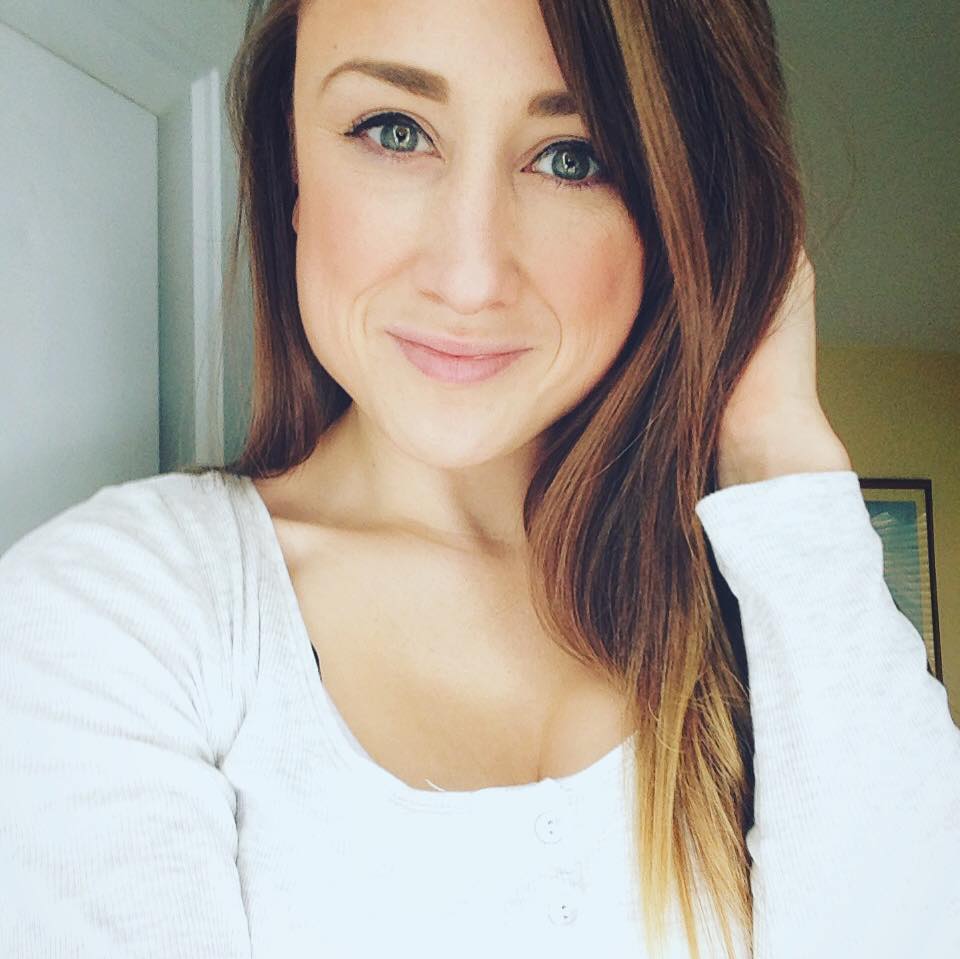
“Currently, I am employed at Sweetser where I am working as a Crisis Stabilization Counselor with both adults and children in residential units. My plan is to take a gap year (in which I will be working full-time), before I apply to UNE’s college of Social Work. My goal is to obtain my Masters in Social Work, and eventually get licensed in order to become a LCSW. I would like to continue to work for Sweetser as either a case manager and/or a clinician, where I would be working with either adults or children with mental illness.
I am so grateful to have had the opportunity to work as a Research Assistant in the RCC Lab. My time in the Lab has honed many skills necessary for professional development, (i.e., communication skills, multi-tasking, time efficiency, as well as professional etiquette). Additionally, I was able to learn how professional research is conducted, from the early stages of running participants and collecting data to presenting our work at symposia and conferences. In addition to working on current lab projects, I also became familiar with other research in the field by conducting an extensive literature review over the course of the year. I am so grateful to have had this experience, I know that I will use all of the skills I have learned in my future endeavors. Thank you to all the labbies and Dr. Stiegler-Balfour for allowing me to be a part of the RCC Lab.”
Ben Katz – Class of 2017
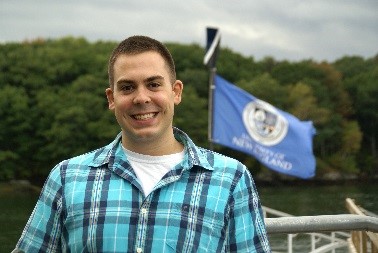
After graduating from UNE, I moved back to my home state of Connecticut, where I began working full-time as a research assistant at the Anxiety Disorders Center, an outpatient clinic on the Institute of Living’s campus, located in Hartford. I currently serve as the primary research assistant on two federally funded grants from the National Institute of Mental Health. One is an R01 randomized clinical trial examining the neural mechanisms of cognitive-behavioral therapy response for individuals with hoarding disorder. The second aims to examine the mechanisms of hyperventilation among patients with anxiety disorders. I have been trained by experts at Yale University on proper data acquisition procedures for the collection of electroencephalogram (EEG) data. I have also been involved in the acquisition and analysis of peripheral physiological indices, including electromyogram, electrodermal activity, heart-rate variability, respiratory sinus arrthymia, and end-tidal CO2, all hypothesized as potential biomarkers of anxiety and related disorders. I am currently applying to clinical psychology Ph.D. programs. I hope become a clinical psychologist and continue to advance our understanding of the etiology of psychopathology and how to best treat it.
I can say with absolute certainty that I would not be where I am today if it wasn’t for Dr. Stiegler-Balfour and her willingness to take me on as a research assistant during the beginning of my freshman year at UNE. My experience in the Reading Comprehension and Cognition lab fueled my passion for empiricism and scientific inquiry. The mentorship that I received from her during my tenure in her lab has made a tremendous impact on me as a scientist and person. Finally, the relationships I built in the Department of Psychology were paramount to my passion for and success in the field of psychology.
To current research assistants: “Don’t be afraid to get out of your comfort zone; let yourselves become vulnerable. Take extra time to struggle through advanced statistics or research designs. Submit an abstract for an oral presentation over a conference presentation, even if you hate public speaking. Go above and beyond because it will only help you grow as a scientist, student, and person.”
To future research assistants: “Your experience as a research assistant is, without a doubt, what you make of it. You can choose to take action and make the most of your research assistantship, or not. Seek guidance and mentorship from your professors; they want to see you succeed just as much as you do.”
Abby LaChance – Class of 2017
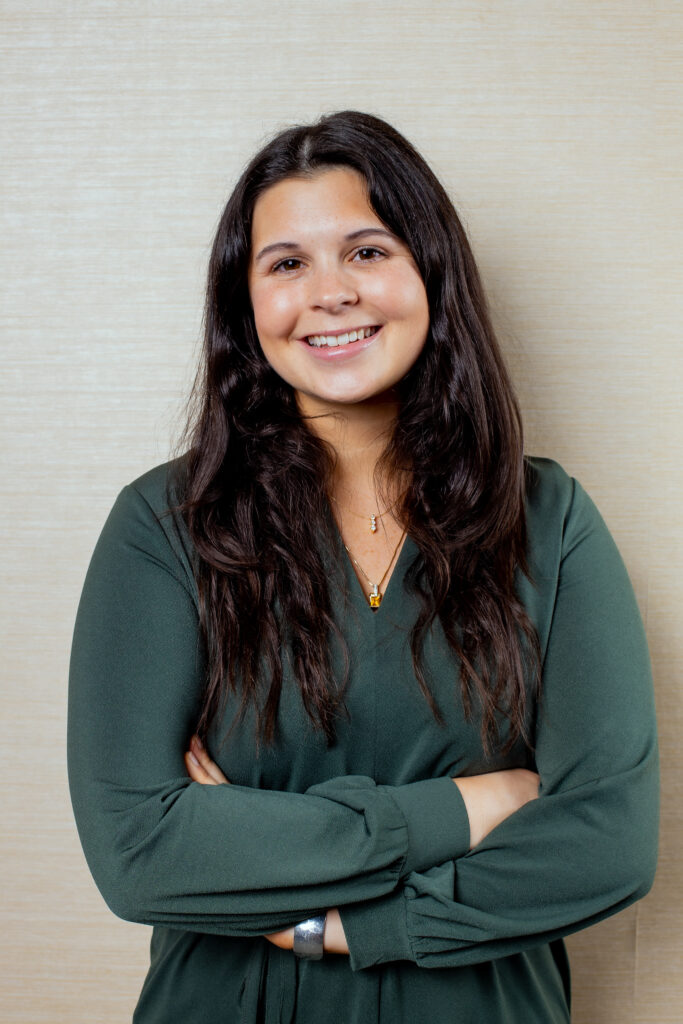
Abby received her Master’s in Justice Studies from the University of New Hampshire. At present, she is working as the Senior Paralegal at Gilman Law P.C. which specializes in criminal defense.
Besides learning laboratory tasks such as analyzing data, running participants, researching articles, and writing/proofreading manuscripts in APA format, Abby has learned many life and career skills throughout her time in the RCC lab. Dr. SB is an incredible resource when it comes to writing cover letters and updating your resume. She is also incredibly knowledgeable of graduate school programs as well as career opportunities. The RCC lab has also helped improve skills such as time management, perseverance, flexibility, self-reflection and taking initiative.
“To current/future research assistants I would advise that you take every opportunity that comes to you. Apply for that conference, because you can never have enough practice presenting research. Go to the events the psychology department hosts, because you never know what kinds of connections you will make. Push yourself to learn each time you enter the lab, because the knowledge you will gain will be worth it. Last but not least, ask for help, because you don’t need to know everything right away but resources are there to help you succeed. Trust me, you will cherish the memories, friendships, and knowledge you gain in the RCC lab!”
Emily Vasseur – Class of 2017
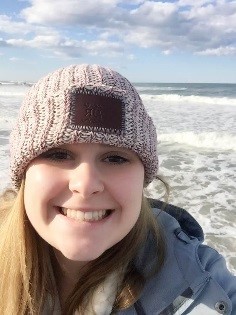
Emily received her Master’s in Clinical Mental Health Counseling from Johns Hopkins University after graduating from UNE. She has worked in settings with individuals of all ages, families, and groups since coming to Maryland. Currently, she is a lead therapist and works with diagnoses related to trauma, adjustment, depression, and anxiety. She is currently exploring other opportunities including an offer as a clinical director and opening her own private practice.
“When I was offered a position doing research at the University of New England with Dr. Stiegler-Balfour in the Reading Comprehension and Cognition lab, I had no idea how much it was going to help me succeed in my studies. I was learning valuable concepts in the classroom and when I got to lab, I was able to apply my new knowledge. Additionally, as an undergraduate research assistant, I wasn’t expecting to do anything other than run participants. Dr. Stiegler-Balfour made sure that we were involved in all aspects of research ranging from designing experiments, analyzing data, presenting finding, and following some of our own interested topics. I even got to propose a research topic, conduct the study, and present the findings are various conferences. All gave me valuable experiences and helped me gain many key skills in the research field. In both my profession and my graduate assistant position, I will be able to utilize everything that I have learned through my experiences in lab.”
“To future research assistants: First, be as dedicated and involved as possible. You can learn so many things in lab so be present, work as hard as you can, ask all of your questions, and follow your passions. Your fellow research assistants and principle investigators are just one of the many resources you can use within the psychology labs at University of New England. Second, attend presentations and conferences. Once you get to share your research findings at various different conferences, you become much more involved in your research and can also ignite a passion that you may not have known about prior. Being able to share your ideas and also discuss your findings with others is so exciting and can really benefit you in the future.”
Zoe Roberts – Class of 2017
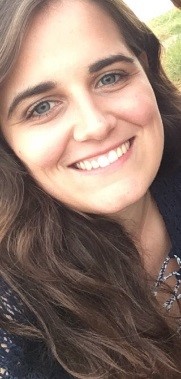
Zoe is attending the University of Massachusetts Amherst, studying to get her PhD in School Psychology. After her previous experience in schools in Biddeford, she decided she would like to pursue a career in the educational system, as a school psychologist.
While working in the research lab, Zoe gained experience with every part of the research process with the help of Dr. Stiegler-Balfour. Overall, working in the RCC Lab made her a better student, a good researcher, and helped her gain self confidence and motivation. She plans to use all these skills throughout the rest of her life, especially in her next chapter at University of Massachusetts Amherst.
“Take advantage of every opportunity, even if you’re not sure it’s right for you. Don’t be afraid to ask questions or to ask for help. And lastly, work hard and never give up!”
Lauren Hayden – Class of 2016
After graduation from UNE, Lauren moved back to Virginia – her home state – to be closer to family, begin her career, and further her education. She graduated from Lock Haven University with her Master’s in Science in Sport and Exercise, Laurens also holds a Master’s of Education in Educational Leadership with a focus on Higher Education from the University of Lynchburg. She spent the previous 7 years in collegiate athletics, most recently working with the women’s basketball team at the U.S. Naval Academy. She is currently in a career transition, with the intention to utilize her psychology degree in her next role. In the meantime, she is working in hospitality at a vineyard in Annapolis, MD.
Working in the research lab at UNE gave me experiences that not every student has access to at other institutions. The RCC Lab provided me an opportunity to not only sharpen my research skills, develop and assist research projects, and interact with participants and professionals in the field, but also to grow and enhance my individual skills as a student and a professional. The RCC Lab was a family atmosphere, working together towards a common goal of bettering our field and was an experience I am so thankful to have had.
To current and future research assistants: take advantage of the opportunities UNE provides. Not every institution has the ability to offer undergraduate students research assistant positions and this will set you apart from others. Dr. SB is a phenomenal supervisor, professor, and mentor who was very willing to work with my busy schedule as a student-athlete to help make the most of my time in the Lab and at UNE. Your time in college is what you make it, and being part of the RCC Lab is certainly a worthwhile investment.
Jessica Hering – Class of 2015
Jessi is currently studying and prepping for her National Board of Certification in Occupational Therapy boards, which is schedule for the end of summer. She currently lives in Portland, ME and is seeking employment while not studying. She hopes to work within a hospital or rehabilitation setting, working with adults and older adults. In the meantime, she is pursuing observation time at the local hospital, within the acute care, older-adult psychiatry and brain injury units. She hopes to eventually work with adults and older adult with brain injury/ stroke.
Within the few years Jessi spent within the research lab, she learned various tasks such as gathering/analyzing data, reading data, analyzing research articles, running participants and more. All of these tasks prepared Jessi for graduate school at UNE as she has two research courses. Participating in the Alzheimer’s study attributed to the passion Jessi has for Gerontology, as well as the studying completed with individuals who have dementia which was conducted this past spring (2017). Jessi’s growing interest in cognition plays a huge role in occupational therapy, as well as the process of learning and memory which was gained from working with Dr. SB and within the research lab itself. Additional skills gained from the experience in working with the research lab includes time management, flexibility and public speaking.
Advice for current/ future students: “My first piece of advice would be advice Dr SB told me once, which is to invest in your education. Taking advantage of all the opportunities that arise throughout your time in the research lab such as participating in various studies and attending conferences are a learning tool that attribute to your education more than you think. The atmosphere at the various conferences are amazing, and speaking at them in general is a proud moment. You will also become more involved in your research and may even discover some of your personal passions within the psychology world. Any career path you take you will take with skills learned in this lab, and that is something I am grateful.”
Andrea Taatjes – Class of 2013
“After graduating from UNE in 2013 I earned my Master’s Degree in Forensic and Counseling at William James College in Newton, MA. I obtained my LMHC (Licensed Mental Health Clinician) in January 2019. Immediately after graduating with my masters I worked full time as a mobile crisis clinician for 2 years. Here I evaluated individuals in psychological crisis and determined appropriate levels of care, helped facilitate placement in community/hospital mental health treatment, and worked with insurance companies to get the level of care approved. In April 2017 I accepted a job as a clinician working for the Department of Youth Services in Dorchester, MA. I worked on a locked juvenile detention unit with 15 adolescent boys ages 15-19 providing individual and group counseling. I worked there for about 3 years, up until I accepted a new position as the Assistant Program Director for a Community Based Mental Health Program in January 2020. I am responsible for providing supervision to both Bachelors and Masters level Clinicians in the Home Based Program (In Home Therapy and Therapeutic Mentoring) and Community Service Agency (Intensive Care Coordinators and Family Partners), which provides community and home based services to children, adolescents and their families. In addition to providing supervision, I assist with diagnosing children and adolescents who enter the program without a diagnosis, completing Mental Status Exams and managing the day to day operations of two programs. This position has allowed me the opportunity to gain valuable supervisory experience as well as understanding the multiple intricacies of running a community mental health program
During my time at the RCC lab, I learned not only about running participants and analyzing data, but how to translate that information into workable knowledge. Dr. SB allowed me the opportunity to be a part of a team and to be published in a journal. I was not only asked, but encouraged to be involved in every step of the process. Before becoming involved in the RCC lab, I had not thought about being involved in research. However, I quickly learned to appreciate the process and even developed my own research project for my senior thesis. My advice to current/future research assistants would be to take advantage of every opportunity that comes your way. The more things you involve yourself in, the more knowledge and experience you will gain. You may learn you have a passion for something you never thought before. Take the opportunity to present your research because not only is it a good experience, but it is something you can look back on and be proud of. Lastly, ask Dr. SB for help when you need it. She is an amazing resource and not only a wonderful professor but a great person who goes above and beyond to help all of her students!”
Hadleigh Smith – Class of 2013
“After graduating from UNE, I moved to Colorado and now live in Denver with my fiance and our dog. In August 2017, I started my fourth year teaching 5th grade at a charter school in Brighton, Colorado. I now lead my team of three 5th grade teachers and recently stepped into an additional role as a math content leader, delivering professional development related to developing numeracy and reasoning skills in 3rd-5th grade students. My job also entails a lot of creative emoji use, cheesy jokes, and wondering how we keep going through sticky notes so quickly in my classroom.
I found that in a relatively competitive job market, research experience in cognition and reading comprehension was something that enabled me to stand out. My involvement with Dr. Stiegler-Balfour’s projects showed potential employers that I had an understanding of how our brains develop automatically at complex cognitive skills, as well as the ability to reference and learn from peer-reviewed scholarly texts. I discovered a few years into my teaching career that building math confidence in my students is one of the most personally rewarding aspects of my job, but my time working with and learning from Dr. Stiegler-Balfour was still incredibly meaningful in helping me glean insight into some of the multi-faceted and universally relevant cognitive processes involved in learning and memory. With Dr. Stiegler-Balfour’s guidance, this type of research became much more approachable and transparent for me, and I think my ability to seek out and learn from peer-reviewed research is something that really benefits my students.
On a more practical note, balancing my time between classes, the lab, student-teaching, and summer commitments was not a skill I had immediately mastered. I learned not to overextend myself, and how much I prefer the feeling of doing my best at a few important commitments rather than scrambling to grab at every small opportunity that was presented. I’m so thankful to have learned this important skill during my college years so that I could put it into practice during my adult life.
Working in Dr. Stiegler-Balfour’s lab is truly a fantastic opportunity! I’d suggest making your time in the lab a priority, and working to build an understanding of how the current research aims relate to your career goals and areas of interest. Dr. Stiegler-Balfour is an wonderful resource, and I think anybody would benefit from working with her!”
